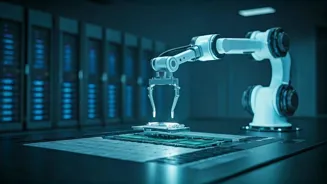The AI Revolution Unfolds
The rise of Artificial Intelligence is reshaping various aspects of modern life, with significant implications for the employment landscape. Experts estimate
that approximately 40 percent of current jobs might be automated in the coming years. This estimation underscores the rapid advancements in AI and its potential to handle tasks previously exclusive to human employees. This shift has sparked discussions regarding the future of work, the need for upskilling, and strategies to minimize job losses. As AI technologies continue to evolve, understanding the possible shifts and their consequences is very important.
Job Market Transformations
The impact of AI on jobs is multifaceted. Many routine, repetitive tasks are now susceptible to automation. This includes roles across various industries such as data entry, customer service, and even parts of manufacturing. These changes suggest a shift toward a workforce that will need to adapt and develop new skills to remain employable. The transformation will also reshape the skills deemed valuable. Jobs that require critical thinking, creativity, and emotional intelligence will likely be in higher demand. Reskilling and upskilling will be essential for workers to seize opportunities in the emerging AI-driven economy.
Navigating the Changes
Preparing for an AI-driven job market requires a proactive approach. Continuous learning is key, as workers will need to upgrade their skills frequently. Understanding and adapting to new technologies can help maintain job security. Developing skills that are difficult for AI to replicate, like creativity, problem-solving, and complex communication, will also be very important. Additionally, support from educational institutions and governments will be important to help workers adapt through training programs and workforce development initiatives. Staying informed about the latest trends in AI and the job market will be important to navigate this complex transition.
















